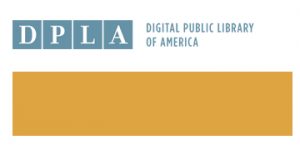 The Chronicle featured a post about the DPLA Tuesday morning, so I thought I’d go over and check it out. DPLA, the Digital Public Library of America, has as its goal to aggregate the records of mostly open content from libraries, archives and museums all around the country. So, for example, let’s say UT has a map collection online — in theory, our collection could be included among the resources that one can access through the DPLA portal. In addition, there is an API open to developers who want to use the metadata behind the digital resources to create interesting ways to get at what’s there. And finally, DPLA is clearly advocating on behalf of libraries, archives and museums, emphasizing the importance of the role we play in preserving works, creating metadata that describe them, and providing access to the great store of cultural materials that are in our public domain.
The Chronicle featured a post about the DPLA Tuesday morning, so I thought I’d go over and check it out. DPLA, the Digital Public Library of America, has as its goal to aggregate the records of mostly open content from libraries, archives and museums all around the country. So, for example, let’s say UT has a map collection online — in theory, our collection could be included among the resources that one can access through the DPLA portal. In addition, there is an API open to developers who want to use the metadata behind the digital resources to create interesting ways to get at what’s there. And finally, DPLA is clearly advocating on behalf of libraries, archives and museums, emphasizing the importance of the role we play in preserving works, creating metadata that describe them, and providing access to the great store of cultural materials that are in our public domain.
So, I did a bit of looking around, looked up some things on Zen, Texas history, and polar bears, and I compared the results I got with those I got from doing the same searches on the global Internet.
Wow. It’s like two completely different worlds. DPLA is ultra-refined searching, narrowed down to what’s mostly, but not entirely, public domain, and digital, whose records have been contributed to the DPLA by a partner library, museum or archive. Sort of like Creative Commons searches, when I want to find only those materials I can reuse, but much narrower. Because there is so much content out there that is not available through DPLA, I sure do appreciate the steps current-day creators take to tag their works with the privileges they freely share with the public. Otherwise, we wait decades (let’s say it’s roughly 100 years now) to be able to say, “I can actually use this wonderful work that you posted online as I wish!” Becoming public domain takes a long, long, long, long time in this country.
And I appreciate all that metadata that libraries and archives and museums have been steadily adding to the records for the works in their collections, the metadata that allows us to let machines do the job of sorting through things for us, and finding just what we’re interested in.


